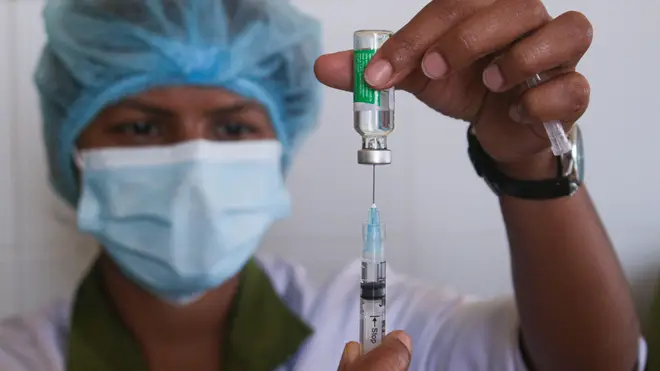
Ian Payne 4am - 7am
15 April 2021, 22:14 | Updated: 15 April 2021, 22:19

The development of a rare blood clot in the brain is up to ten times more likely following Covid-19 infection than after taking a vaccine, a new study suggests.
Researchers at the University of Oxford found cerebral venous thrombosis (CVT) was more common in people who caught coronavirus than comparison groups.
The study also found 30% of CVT cases occurred in under 30s.
It comes as the association of jabs with rare blood clots comes under continued scrutiny, with the UK’s medicines regulator saying people under 30 will be offered a different jab.
Denmark has stopped using the vaccine completely despite the European Medicines Agency backing its use and the World Health Organisation saying there is an overwhelming argument to make use of it.
The UK's Medicines and Healthcare products Regulatory Agency has stressed the vaccine’s benefits outweigh any risks and evidence shows the vaccine is overwhelmingly safe.
Read more: What are the rare blood clots linked to AstraZeneca vaccine and what are the symptoms?

Blood clots from AZ jab 'such a rare' reaction, says former MHRA chief
Paul Harrison, Professor of Psychiatry and Head of the Translational Neurobiology Group at the University of Oxford, said: “There are concerns about possible associations between vaccines and CVT, causing governments and regulators to restrict the use of certain vaccines.
"Yet, one key question remained unknown: What is the risk of CVT following a diagnosis of COVID-19?
"We've reached two important conclusions. Firstly, COVID-19 markedly increases the risk of CVT, adding to the list of blood clotting problems this infection causes.
Read more: US recommends pause to Johnson & Johnson Covid jab rollout over blood clot reports
Read more: Blood clotting is 'super rare side effect' of AstraZeneca vaccine
"Secondly, the COVID-19 risk is higher than we see with the current vaccines, even for those under 30; something that should be taken into account when considering the balances between risks and benefits for vaccination."
The research, which is not yet peer reviewed, calculated 39 in a million people with Covid-19 developed CVT.
By comparison, four in a million developed it after the Pfizer or Moderna jabs, and it occurred in five in a million after the first dose of the Oxford/AstraZeneca vaccine.
Read more: Rare AstraZeneca vaccine blood clot 'side effect' will not stop roadmap, PM says

'Blood clotting is a rare side effect of the AstraZeneca vaccine'
This means the risk of developing CVT was eight to ten times greater than if a person was vaccinated.
Researchers warned that the data should be "interpreted cautiously" because it came from multiple sources and there could be under-reporting or miscoding of CVT in medical records the study relied on.
Dr Maxime Taquet, also from the Translational Neurobiology Group, said: "However, the signals that COVID-19 is linked to CVT, as well as portal vein thrombosis – a clotting disorder of the liver – is clear, and one we should take note of."